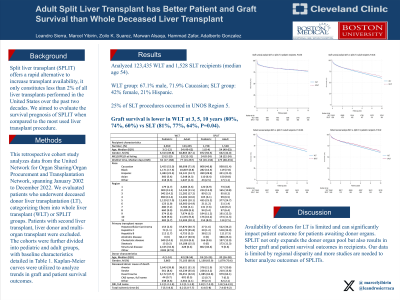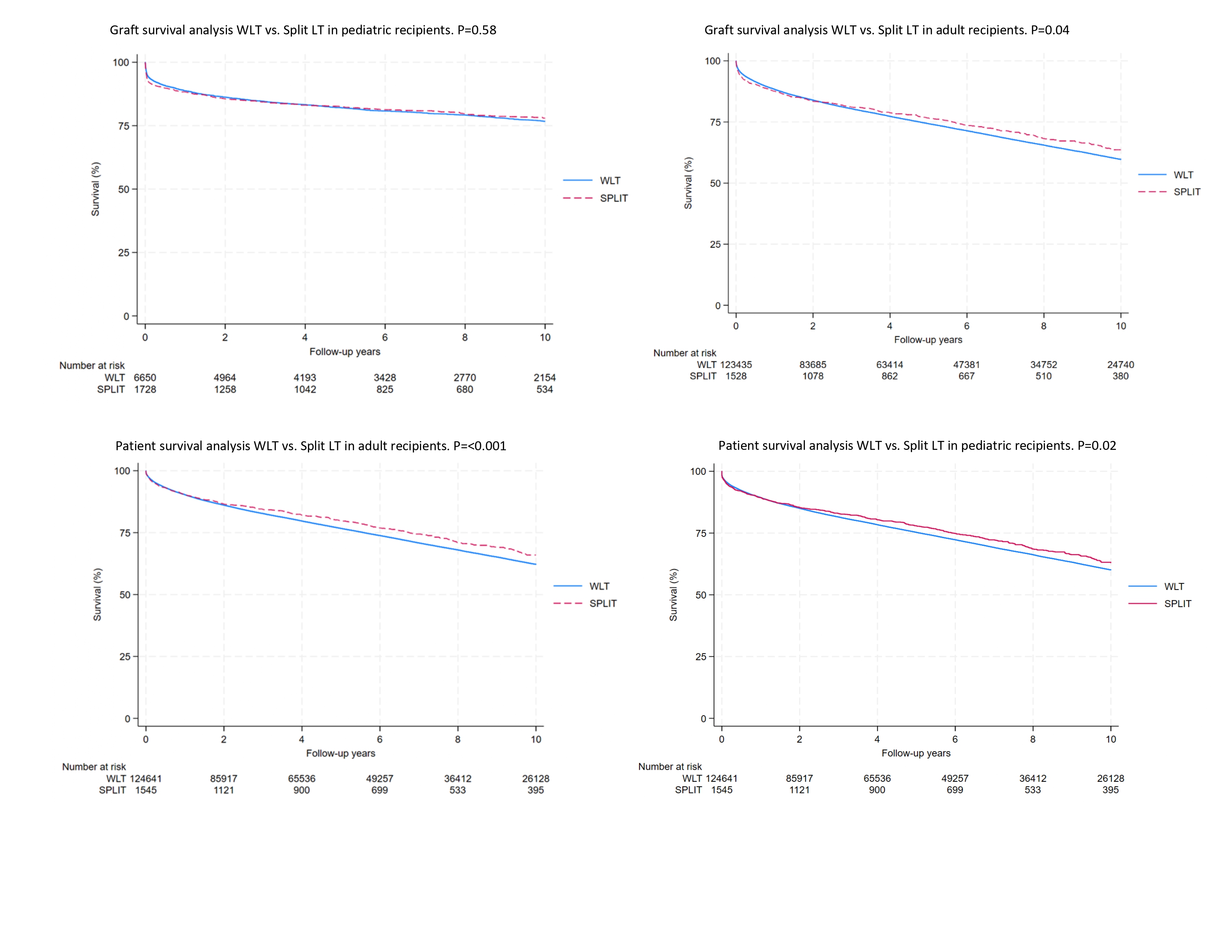Tuesday Poster Session
Category: Liver
P4690 - Adult Split Liver Transplant has Better Patient and Graft Survival Than Whole Deceased Liver Transplant in the United States
Tuesday, October 29, 2024
10:30 AM - 4:00 PM ET
Location: Exhibit Hall E

Has Audio
- MY
Marcel Yibirin Wakim, MD
Boston Medical Center, Boston University School of Medicine
Boston, MA
Presenting Author(s)
Leandro Sierra, MD1, Zoilo K.. Suarez, MD2, Marcel Yibirin, MD3, Butros Fakhoury, MD4, Joaquin A.. Calderon, MD5, Hammad Zafar, MD6, Adalberto Gonzalez, MD7
1Cleveland Clinic Foundation, Cleveland, OH; 2Florida Atlantic University, Charles E. Schmidt College of Medicine, Boca Raton, FL; 3Boston Medical Center, Boston University School of Medicine, Boston, MA; 4St. Elizabeth's Medical Center, Boston University School of Medicine, Brighton, MA; 5George Washington University, Washington, DC; 6Cleveland Clinic Florida, Weston, FL; 7Cleveland Clinic Florida, Boca Raton, FL
Introduction: Split liver transplant (SPLIT) offers a rapid alternative to increase transplant availability, it only constitutes less than 2% of all liver transplants performed in the United States over the past two decades. We aimed to evaluate the survival prognosis of SPLIT when compared to the most used liver transplant procedure.
Methods: This retrospective cohort study analyzes data from the United Network for Organ Sharing/Organ Procurement and Transplantation Network, spanning January 2002 to December 2022. We evaluated patients who underwent deceased donor liver transplantation (LT), categorizing them into whole liver transplant (WLT) or SPLIT groups. Patients with second liver transplant, liver donor and multi-organ transplant were excluded. The cohorts were further divided into pediatric and adult groups, with baseline characteristics detailed in Table 1. Kaplan-Meier curves were utilized to analyze trends in graft and patient survival outcomes.
Results: A total of 123,435 adult WLT recipients and 1,528 SPLIT adult recipients were analyzed. The median age was 54 years. WLT recipients were predominantly male (67.1%), while SPLIT recipients were predominantly female (42.0%). 25% of the total SPLIT procedures were performed in one out of the 11 UNOS regions (Region 5). Caucasian recipients were more prevalent in the WLT group (71.9%) compared to the SLT group (61.4%), whereas Hispanic recipients were more common in the SPLIT group (21.0% vs 14.7%). The primary indication for transplant in WLT recipients was hepatitis C cirrhosis, whereas hepatocellular carcinoma was more prevalent in SPLIT recipients. Donors for adult recipients of WLT had a higher disease risk index (1.8 vs 1.3) and longer cold ischemic time (7.4 vs 6.2 hours) compared to SLT donors. Graft survival at 3, 5, and 10 years was significantly lower in WLT recipients (80%, 74%, and 60%, respectively) compared to SLT recipients (81%, 77%, and 64%, respectively) (P=0.04). Similarly, patient survival at 3, 5, and 10 years was significantly lower in WLT recipients (83%, 77%, and 62%, respectively) compared to SPLIT recipients (84%, 80%, and 66%, respectively) (P=0.02).
Discussion: Availability of donors for LT is limited and can significantly impact patient outcome for patients awaiting donor organs. SPLIT not only expands the donor organ pool but also results in better graft and patient survival outcomes in recipients. Our data is limited by regional disparity and more studies are needed to better analyze outcomes of SPLITs.

Note: The table for this abstract can be viewed in the ePoster Gallery section of the ACG 2024 ePoster Site or in The American Journal of Gastroenterology's abstract supplement issue, both of which will be available starting October 27, 2024.
Disclosures:
Leandro Sierra, MD1, Zoilo K.. Suarez, MD2, Marcel Yibirin, MD3, Butros Fakhoury, MD4, Joaquin A.. Calderon, MD5, Hammad Zafar, MD6, Adalberto Gonzalez, MD7. P4690 - Adult Split Liver Transplant has Better Patient and Graft Survival Than Whole Deceased Liver Transplant in the United States, ACG 2024 Annual Scientific Meeting Abstracts. Philadelphia, PA: American College of Gastroenterology.
1Cleveland Clinic Foundation, Cleveland, OH; 2Florida Atlantic University, Charles E. Schmidt College of Medicine, Boca Raton, FL; 3Boston Medical Center, Boston University School of Medicine, Boston, MA; 4St. Elizabeth's Medical Center, Boston University School of Medicine, Brighton, MA; 5George Washington University, Washington, DC; 6Cleveland Clinic Florida, Weston, FL; 7Cleveland Clinic Florida, Boca Raton, FL
Introduction: Split liver transplant (SPLIT) offers a rapid alternative to increase transplant availability, it only constitutes less than 2% of all liver transplants performed in the United States over the past two decades. We aimed to evaluate the survival prognosis of SPLIT when compared to the most used liver transplant procedure.
Methods: This retrospective cohort study analyzes data from the United Network for Organ Sharing/Organ Procurement and Transplantation Network, spanning January 2002 to December 2022. We evaluated patients who underwent deceased donor liver transplantation (LT), categorizing them into whole liver transplant (WLT) or SPLIT groups. Patients with second liver transplant, liver donor and multi-organ transplant were excluded. The cohorts were further divided into pediatric and adult groups, with baseline characteristics detailed in Table 1. Kaplan-Meier curves were utilized to analyze trends in graft and patient survival outcomes.
Results: A total of 123,435 adult WLT recipients and 1,528 SPLIT adult recipients were analyzed. The median age was 54 years. WLT recipients were predominantly male (67.1%), while SPLIT recipients were predominantly female (42.0%). 25% of the total SPLIT procedures were performed in one out of the 11 UNOS regions (Region 5). Caucasian recipients were more prevalent in the WLT group (71.9%) compared to the SLT group (61.4%), whereas Hispanic recipients were more common in the SPLIT group (21.0% vs 14.7%). The primary indication for transplant in WLT recipients was hepatitis C cirrhosis, whereas hepatocellular carcinoma was more prevalent in SPLIT recipients. Donors for adult recipients of WLT had a higher disease risk index (1.8 vs 1.3) and longer cold ischemic time (7.4 vs 6.2 hours) compared to SLT donors. Graft survival at 3, 5, and 10 years was significantly lower in WLT recipients (80%, 74%, and 60%, respectively) compared to SLT recipients (81%, 77%, and 64%, respectively) (P=0.04). Similarly, patient survival at 3, 5, and 10 years was significantly lower in WLT recipients (83%, 77%, and 62%, respectively) compared to SPLIT recipients (84%, 80%, and 66%, respectively) (P=0.02).
Discussion: Availability of donors for LT is limited and can significantly impact patient outcome for patients awaiting donor organs. SPLIT not only expands the donor organ pool but also results in better graft and patient survival outcomes in recipients. Our data is limited by regional disparity and more studies are needed to better analyze outcomes of SPLITs.

Figure: Survival outcomes of adult and pediatric patients undergoing WLT and SPLIT from 2002-2023
Note: The table for this abstract can be viewed in the ePoster Gallery section of the ACG 2024 ePoster Site or in The American Journal of Gastroenterology's abstract supplement issue, both of which will be available starting October 27, 2024.
Disclosures:
Leandro Sierra indicated no relevant financial relationships.
Zoilo Suarez indicated no relevant financial relationships.
Marcel Yibirin indicated no relevant financial relationships.
Butros Fakhoury indicated no relevant financial relationships.
Joaquin Calderon indicated no relevant financial relationships.
Hammad Zafar indicated no relevant financial relationships.
Adalberto Gonzalez indicated no relevant financial relationships.
Leandro Sierra, MD1, Zoilo K.. Suarez, MD2, Marcel Yibirin, MD3, Butros Fakhoury, MD4, Joaquin A.. Calderon, MD5, Hammad Zafar, MD6, Adalberto Gonzalez, MD7. P4690 - Adult Split Liver Transplant has Better Patient and Graft Survival Than Whole Deceased Liver Transplant in the United States, ACG 2024 Annual Scientific Meeting Abstracts. Philadelphia, PA: American College of Gastroenterology.
